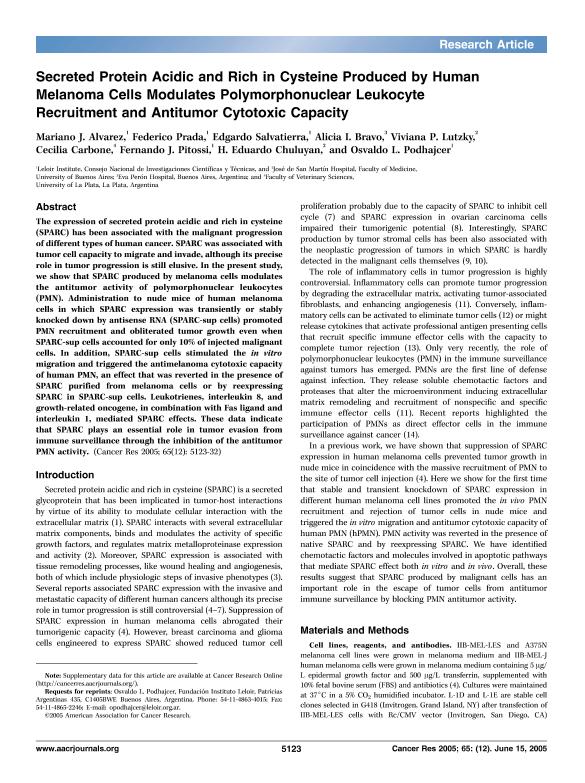Artículo
Secreted protein acidic and rich in cysteine produced by human melanoma cells modulates polymorphonuclear leukocyte recruitment and antitumor cytotoxic capacity
Alvarez, Mariano J.; Prada, Federico; Salvatierra, Edgardo; Bravo, Alicia I.; Lutzky, Viviana P.; Carbone, Cecilia; Pitossi, Fernando Juan ; Chuluyan, H. Eduardo; Podhajcer, Osvaldo Luis
; Chuluyan, H. Eduardo; Podhajcer, Osvaldo Luis
 ; Chuluyan, H. Eduardo; Podhajcer, Osvaldo Luis
; Chuluyan, H. Eduardo; Podhajcer, Osvaldo Luis
Fecha de publicación:
06/2005
Editorial:
American Association for Cancer Research
Revista:
Cancer Research
ISSN:
0008-5472
e-ISSN:
1538-7445
Idioma:
Inglés
Tipo de recurso:
Artículo publicado
Clasificación temática:
Resumen
The expression of secreted protein acidic and rich in cysteine (SPARC) has been associated with the malignant progression of different types of human cancer. SPARC was associated with tumor cell capacity to migrate and invade, although its precise role in tumor progression is still elusive. In the present study, we show that SPARC produced by melanoma cells modulates the antitumor activity of polymorphonuclear leukocytes (PMN). Administration to nude mice of human melanoma cells in which SPARC expression was transiently or stably knocked down by antisense RNA (SPARC-sup cells) promoted PMN recruitment and obliterated tumor growth even when SPARC-sup cells accounted for only 10% of injected malignant cells. In addition, SPARC-sup cells stimulated the in vitro migration and triggered the antimelanoma cytotoxic capacity of human PMN, an effect that was reverted in the presence of SPARC purified from melanoma cells or by reexpressing SPARC in SPARC-sup cells. Leukotrienes, interleukin 8, and growth-related oncogene, in combination with Fas ligand and interleukin 1, mediated SPARC effects. These data indicate that SPARC plays an essential role in tumor evasion from immune surveillance through the inhibition of the antitumor PMN activity.
Palabras clave:
Cancer
,
Sparc
,
Neutrophils
Archivos asociados
Licencia
Identificadores
Colecciones
Articulos(IIBBA)
Articulos de INST.DE INVEST.BIOQUIMICAS DE BS.AS(I)
Articulos de INST.DE INVEST.BIOQUIMICAS DE BS.AS(I)
Citación
Alvarez, Mariano J.; Prada, Federico; Salvatierra, Edgardo; Bravo, Alicia I.; Lutzky, Viviana P.; et al.; Secreted protein acidic and rich in cysteine produced by human melanoma cells modulates polymorphonuclear leukocyte recruitment and antitumor cytotoxic capacity; American Association for Cancer Research; Cancer Research; 65; 12; 6-2005; 5123-5132
Compartir
Altmétricas



